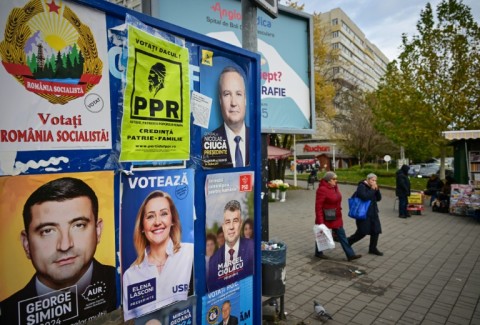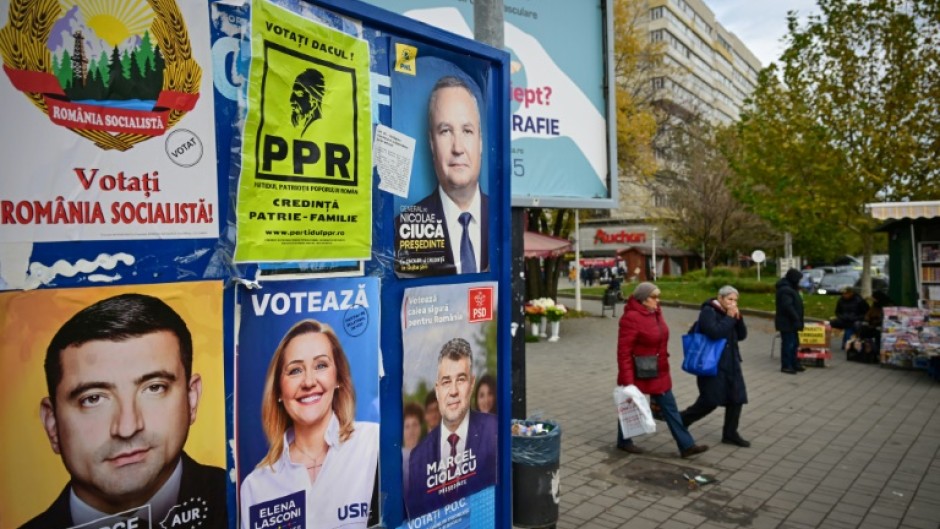Romanian police raided houses on Saturday, a day after the top court cancelled the presidential vote in an unprecedented development following allegations of Russian interference in favour of the far-right frontrunner.
The court's shock move, just before the presidential run-off, opens the way for a new electoral process to start from scratch in the EU and NATO member state bordering war-torn Ukraine.
A new government -- to be formed after last weekend's legislative elections that were won by the ruling Social Democrats but saw big far-right gains -- will set a new presidential election date.
The annulment comes after a spate of intelligence documents declassified this week by the presidency detailed allegations against far-right presidential frontrunner Calin Georgescu and Russia, including "massive" social media promotion and cyberattacks.
Police searched three houses in Brasov city in central Romania on Saturday as part of the investigation "in connection with crimes of voter corruption, money laundering, computer forgery," said a statement from the prosecutor's office.
It said the swoop targeted a person involved in the "illegal financing of the electoral campaign of a candidate for the presidency of Romania, through the use of sums of money," without naming Georgescu.
The prosecutor's office would not name the person at the heart of the operation either.
The investigations also concern the violation of the law on the prohibition of organisations and symbols of a fascist, racist or xenophobic nature, the statement added.
- TikTok promotion -
Little-known outsider Georgescu, who unexpectedly topped the first round of voting on November 24, was favourite to win the second round on Sunday against centrist pro-EU mayor Elena Lasconi, according to several polls.

But the documents drawn up for a top security council meeting after the first round of voting "revealed an aggressive promotional campaign, in violation of electoral legislation, and an exploitation of algorithms to increase the popularity of Calin Georgescu at an accelerated pace".
One TikTok user paid $381,000 to those involved in the promotion of Georgescu between October 24 and November 24, according to one of the documents.
The document identified that user as businessman Bogdan Peschir, who has compared his support for Georgescu to the world's richest man Elon Musk's backing of US president-elect Donald Trump.
Another declassified document said Romania was a "target for aggressive Russian hybrid actions", including cyberattacks.
More than 85,000 cyberattacks -- including "on election day" -- were identified, according to Romanian authorities.
Based on those claims, the constitutional court on Friday unanimously decided to annul the entire electoral process, saying it had been "marred... by multiple irregularities and violations of electoral legislation".
- 'Denying people's will' -
The United States said it had faith in Romania's institutions and called for a "peaceful democratic process".
Trump's eldest son, Donald Trump Jr., on X branded the cancelation of the vote as an "attempt at rigging the outcome" and "denying the will of the people".
Georgescu, a 62-year-old former civil servant, called it "a formalised coup d'etat" and said democracy was "under attack".

His team on Saturday declined to comment on the raids, saying they "will not comment or provide answers until we have exact data".
A past admirer of Russian President Vladimir Putin, the EU and NATO sceptic in recent days has reframed himself as "ultra pro-Trump," vowing to put Romania "on the world map" and cut aid for neighbouring Ukraine.
Romania's pro-EU President Klaus Iohannis said Friday that he would stay in his post until a new government can be formed to set a fresh presidential election date.
In last weekend's parliamentary elections, the governing pro-European Social Democrats won the legislative vote, but far-right parties secured a third of the ballots.
Since the 1989 fall of Communism, Romania has not seen such a breakthrough by the far-right banking on mounting anger over soaring inflation and Russia's war in Ukraine.
In a joint appeal on Wednesday, the Social Democrats and three other pro-EU parties -- together making up an absolute majority in parliament -- signed an agreement to form a coalition, promising "stability".
By Ani Sandu And Fulya Ozerkan


